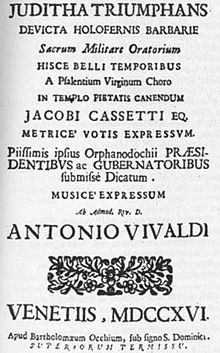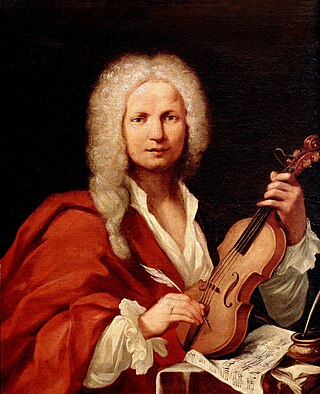
Antonio Lucio Vivaldi was an Italian composer, virtuoso violinist and impresario of Baroque music. Regarded as one of the greatest Baroque composers, Vivaldi's influence during his lifetime was widespread across Europe, giving origin to many imitators and admirers. He pioneered many developments in orchestration, violin technique and programmatic music. He consolidated the emerging concerto form, especially the solo, into a widely accepted and followed idiom.

The Ospedale della Pietà was a convent, orphanage, and music school in Venice. Like other Venetian ospedali, the Pietà was first established as a hospice for the needy. A group of Venetian nuns, called the Consorelle di Santa Maria dell’Umiltà, established this charitable institution for orphans and abandoned girls in the fourteenth century.

The Book of Judith is a deuterocanonical book included in the Septuagint and the Catholic and Eastern Orthodox Christian Old Testament of the Bible but excluded from the Hebrew canon and assigned by Protestants to the apocrypha. It tells of a Jewish widow, Judith, who uses her beauty and charm to kill an Assyrian general who has besieged her city, Bethulia. With this act, she saves nearby Jerusalem from total destruction. The name Judith, meaning "praised" or "Jewess", is the feminine form of Judah.
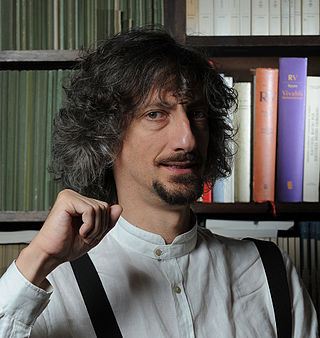
Federico Maria Sardelli is an Italian conductor, historicist-composer, musicologist, comic artist, and flautist, resident in Florence. He founded the medieval ensemble Modo Antiquo in 1984. In 1987, Modo Antiquo also became a baroque orchestra, debuting with the performance of Jean-Baptiste Lully's Ballet des Saisons in front of an audience of about five thousand.
The year 1716 in music involved some significant events.

Francesco Gasparini was an Italian Baroque composer and teacher whose works were performed throughout Italy, and also on occasion in Germany and England.

Spyridon, also Spyridon of Tremithus is a saint honoured in both the Eastern and Western Christian traditions.

Pinchgut Opera is a chamber opera company in Sydney, Australia, presenting opera from the 17th and 18th centuries performed on period instruments. Founded in 2002, Pinchgut stages two operas each year in Sydney's City Recital Hall. It also performs concerts in both Sydney and Melbourne.
Antonio Vivaldi wrote at least three Gloria compositions, settings of the hymn Gloria in excelsis Deo, with words probably dating back to the 4th century, and an integral part of the mass ordinary. Two of them have survived: RV 588 and RV 589. A third, RV 590, is mentioned only in the Kreuzherren catalogue and presumed lost. The RV 589 Gloria is a familiar and popular piece among sacred works by Vivaldi. It was probably written at about the same time as the RV 588, possibly in 1715.
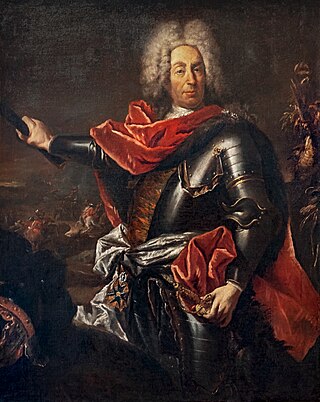
Marshal Johann Matthias Reichsgraf von der Schulenburg was a German aristocrat and general of Brandenburg-Prussian background who served in the Saxon and Venetian armies in the early 18th century and found a second career in retirement in Venice, as a grand collector and patron. His sister was Melusine von der Schulenburg, Duchess of Kendal. His father was Gustavus Adolphus, Baron von der Schulenburg.
Santadella Pietà was an Italian singer, composer, and violinist.
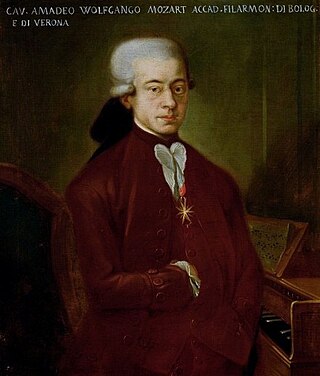
La Betulia liberata is a libretto by Pietro Metastasio which was originally commissioned by Emperor Charles VI and set to music by Georg Reutter the Younger in 1734. It was subsequently set by as many as 30 composers, including Niccolò Jommelli (1743), Ignaz Holzbauer (1752), Florian Leopold Gassmann (1772), Joseph Schuster (1787), and most famously Wolfgang Amadeus Mozart (1771).
Note La Giuditta may refer to one of several Italian oratorios, further elaborated below.

Judith is an oratorio composed by Thomas Arne with words by the librettist, Isaac Bickerstaffe. It was first performed on 27 February 1761 at Drury Lane Theatre. It depicts the story of Judith, taken from the Book of Judith of the Old Testament. It was first published in 1761 and republished with edits in 1764. The piece is divided into three acts, with a total of 28 movements including nine choruses, two duets, an overture, and 16 arias.
Anna Girò, also known as l'Annina del Prete Rosso, la Nina del Prete Rosso, or l'Annina della Pietà, was the stage name of Anna Maria(?) Maddalena Tessieri, an Italian mezzo-soprano/contralto of the 18th century. She is best remembered for her numerous collaborations with composer Antonio Vivaldi who wrote operatic roles for her. She is the singer who performed the greatest number of Vivaldi's operas, the one who kept them in her repertoire the longest time and who made them known across the largest geographical area.
Delphine Galou is a French contralto. Her vocal style allows her to perform the most virtuoso roles of the baroque repertoire.

The Ospedale degli Incurabili is a large sixteenth-century hospital building on the Fondamenta delle Zattere, in the sestiere of Dorsoduro, in Venice in north-eastern Italy. Today it is occupied by the Accademia di Belle Arti di Venezia. It was built in the second half of the sixteenth century; the church – which no longer exists – may have been designed by Jacopo Sansovino.

Gennaro (Janvier) D'Alessandro or D'Alessandri, Alexandre, Allexandro, D'Allessandria was an Italian Baroque composer and harpsichordist.
Anna Maria della Pietà, was an Italian violinist, composer and teacher based in the Venetian orphanage Ospedale della Pietà.

Bonaventura Furlanetto was an Italian composer and music teacher, also known in his lifetime by the nickname Musin. His pupils included Anselmo Marsand and Giovanni Pacini.
